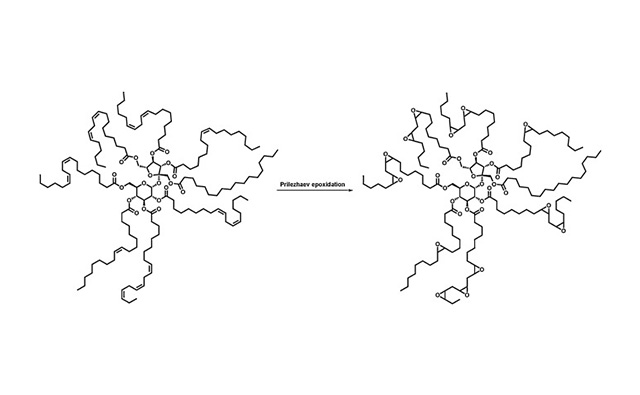Industry News, Coatings
Highly functional methacrylated bio-based resins for UV-curable coatings

Industry News, Coatings

In a new study highly functional methacrylated bio-based resin formulations were photopolymerised.
A series of highly functional methacrylated bio-based resins were synthesised and used in the formulation of UV curable coatings systems. Methacrylated epoxidised sucrose soyate (MESS) and dimethacrylated epoxidised sucrose soyate (DMESS) were synthesised from epoxidised sucrose soyate (ESS). The resins were combined with multifunctional reactive diluents and a photoinitiator and cured under UV light. A commercially available bisphenol A glycerolate dimethacrylate (BisGMA) resin was used as the control.
The curing kinetics was studied using real-time infrared spectroscopy equipped with a UV light. Shrinkage of the coatings was measured by the volume change before and after the curing process. The extent of cure was determined using Attenuated Total Reflectance-Fourier transform infrared spectroscopy (ATR-FTIR). Thermal and mechanical properties were evaluated using thermogravimetric analysis (TGA), thermomechanical analysis (TMA), and atomic force microscopy (AFM). Performance of the coatings was also assessed by measuring the moisture uptake and abrasion resistance.
Coatings made from these formulations displayed good solvent resistance and hardness due to the high crosslink density achieved due to the high number of functional groups on the bio-based resin system.
The study is published in: Progress in Organic Coatings Volume 122, September 2018, Pages 219-228
Highly functional methacrylated bio-based resins for UV-curable coatings
Arvin Z.Yu, Jonas M.Sahouani, Dean C.Webster
Abstract
A series of highly functional methacrylated bio-based resins were synthesized and used in the formulation of UV curable coatings systems. Methacrylated epoxidized sucrose soyate (MESS) and dimethacrylated epoxidized sucrose soyate (DMESS) were synthesized from epoxidized sucrose soyate (ESS). The resins were combined with multifunctional reactive diluents and a photoinitiator and cured under UV light. A commercially available bisphenol A glycerolate dimethacrylate (BisGMA) resin was used as the control. The curing kinetics was studied using real-time infrared spectroscopy equipped with a UV light. Shrinkage of the coatings was measured by the volume change before and after the curing process. The extent of cure was determined using Attenuated Total Reflectance-Fourier transform infrared spectroscopy (ATR-FTIR). Thermal and mechanical properties were evaluated using thermogravimetric analysis (TGA), thermomechanical analysis (TMA), and atomic force microscopy (AFM). Performance of the coatings was also assessed by measuring the moisture uptake and abrasion resistance. Coatings made from these formulations displayed good solvent resistance and hardness due to the high crosslink density achieved due to the high number of functional groups on the bio-based resin system.
Bio-based, UV-curable thermosets, Photopolymerization